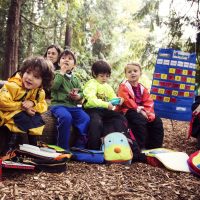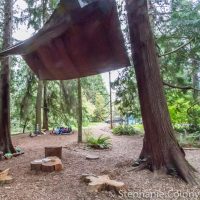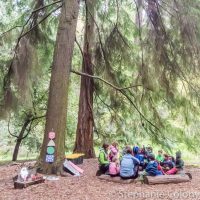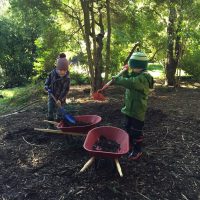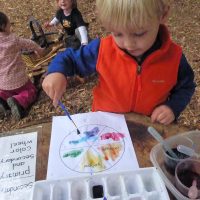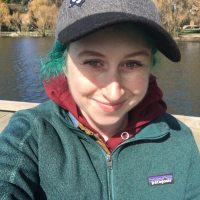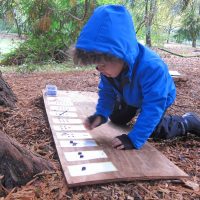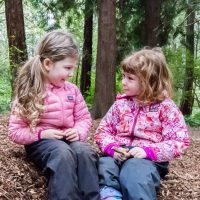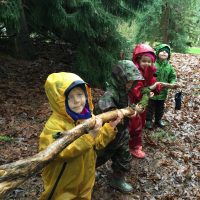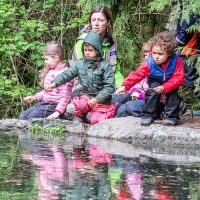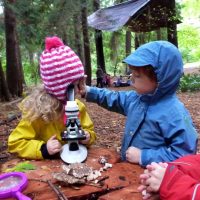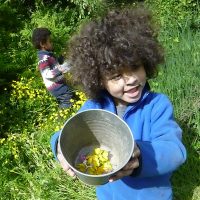Take a peek inside our forest school with this episode produced by the Seattle Channel:
Fiddleheads Forest School believes in supporting the growth of the whole child through attention to their social and emotional development, self-regulation and physical development.
Philosophy: Children are intrinsically motivated to learn, and they do so by exploring the world around them. We aim to create an ideal setting for students ages 3-6 to grow into citizens of the world, with a respect for all cultures and environments and the desire to engage with their communities.
Our Mission: At Fiddleheads Forest School, in the Washington Park Arboretum, we foster a sense of wonder through guidance and exploration as a community of people, plants, and place.
As we teach, learn, and grow together as a community, we carry with us the understanding that the ground we walk upon is the ancestral home of the Muckleshoot and Duwamish people, and we honor their connection and hereditary rights to this land. We acknowledge the history of this place and the villages that stood where we hold our forest school today; as well as the traditional ways of teaching children to respect and care for the earth.
We use a unique individualized curriculum that not only provides children with the skills they need to be prepared for kindergarten, but the ability to regulate themselves, and navigate interactions and friendships with others. When children leave Fiddleheads Forest School to enter their next phase they can…
- Participate as a member of an interdependent community
- Care for themselves and those around them
- Realize and express their own needs in a clear way
- Cooperate with other children to accomplish group goals
- Understand the expectations of others in a given setting
- Express many human emotions in language and art
- Be inquisitive and make connections
- Initiate new ideas and invent solutions to problems
- Keep working at difficult tasks or come back to them later in order to succeed
- Run, catch, throw, kick and tumble
- Laugh and play with a sense of joy
- Paint, draw, sculpt, and construct objects of beauty
- Care for common spaces and materials to maintain cleanliness and order
- Act in stewardship for the environment and one’s own health and well-being
Commitment to Equity and Cultural Responsiveness
Children develop an identity and an awareness of themselves and their relation to one- another in the context of their environment. At Fiddleheads, we strive to create a classroom setting that celebrates and supports our diverse community of families. We believe that high quality early childhood education must consider the greater context in which we operate; environmentally, historically, socially, and culturally. We respect the divergent needs, experiences, and learning styles of our students and work to embody them in our approach. We are deeply committed to honoring and valuing equity and diversity in our policy and practice.
As a school, we are dedicated to social justice, racial justice, and environmental justice. Our goal is to provide an inclusive classroom environment that is accessible to all children and that embodies anti-bias, anti-racism, and multicultural learning. As teachers, we actively identify and counter stereotypes, prejudice, and discrimination, and we educate and empower our students to do the same. We teach children to notice and appreciate their similarities and differences, to take pride in themselves and their identity, and to develop respect and understanding for one-another. We provide our young learners with tools to negotiate conflict and differences of opinion peacefully and thoughtfully.
The diverse family, cultural, and religious experiences and traditions of our community are incredibly important to us. We invite all families to share their culture and traditions at school, and to help us to continue to refine our approach. If at any time you are not comfortable allowing your child to participate in these shared cultural or religious activities, or you feel that your experiences are not being reflected in our practice, please let us know. Our goal is to develop a program that is responsive and respectful of your family. We recognize that this work does not have an endpoint and requires continuing critical self-reflection and education. Our goal is for Fiddleheads to continue to grow and change in response to our community.
Our Approach
Our Approach
Self-Regulation in the Forest
At Fiddleheads we root the learning experience in a strong foundation of self-regulation skills. Self-regulation is the motor that drive all learning on a biological, emotional, cognitive, and social level. We agree with what lead educators and researchers already contend: that self-regulation has the potential to impact the life trajectory of children more than any other single aspect of their development.
To aid in this process we utilize a combination of unique and modified curriculum (including The Zones of Regulation™ and We Thinkers® ) with the intent of cultivating self-regulation, executive functioning skills, and the sort of social and emotional competency that fosters lifelong learners.
Interested in Learning More? Check out the following resources!
Children & Nature Network: Benefits of Early Childhood Nature Connection Infographic
https://eadn-wc04-796033.nxedge.io/cdn/wp-content/uploads/CCCN_earlychildnatureconn_22-1-18.pdf
Children & Nature Network: Benefits of Nature-Health and Wellness
https://eadn-wc04-796033.nxedge.io/cdn/wp-content/uploads/CNN_NatureImprove_16-10-27_O_newlogo.pdf
Keep the learning going outside of Fiddleheads
Project Nature: Get Outside Today and Everyday
Zones of Regulation™
https://www.zonesofregulation.com/uploads/3/4/1/7/34178767/english_reproducible_b.pdf
Our Classroom
Our Classroom
Fiddleheads has three classroom sites located among the native trees and shrubs at the Washington Park Arboretum. At Fiddleheads, students spend the morning exploring and engaging in a multitude of ways. We focus on social-emotional learning, teach with seasons in mind, and incorporate the Since Time Immemorial Curriculum. We also blend in art, science, play, and self-regulation within these aspects of our classroom.
For example, on a given morning you might encounter:
- Children gathered at the peace table to discuss what “zone” they are in, examine emotions cards, or use the peace rose to resolve a conflict independently.
- A mixed age group heading under a climbing structure made of branches deeply engaged in imaginative play; the structure has transformed into a den, and they are a family of wolves, bringing food home to their pups.
- Students looking through magnifying glasses examining bugs, leaves with a jelly fungus on it, and more.
- Children and teachers following the sound of alarming crows to discover a young Cooper’s hawk or owl in the branches of a Douglas Fir Tree. Later, the students will process the morning’s lessons by incorporating the experience into their own play or recording it in a waterproof nature journal.
- A circle time spent discussing the morning’s activities and integrating them into whatever we are studying at the time—whether that means connecting them to a social thinking concept like whole body listening or to a natural science unit on raptors. On chilly days the children prepare cedar tea to sip as they sing songs about lichen, count the days of the month or the days of the year, and reflect on the experiences they’ve had as a group.
- An adventure out into the arboretum. There is an incredible wealth of wildlife here, and at Fiddleheads we take advantage of all it has to offer. The children know that the forest grove may be their classroom, but the Arboretum is their school, and on a given morning, anything is possible.
Our Staff

Meredith Whye (She/Her) – Head of School
Meredith is the Head of School starting summer 2025. She has spent significant time living, working, and researching in East Africa, and recently relocated to Seattle. Meredith holds a Ph.D. in Curriculum & Instruction from the University of Wisconsin–Madison, where her research focused on early childhood education reform in post-conflict settings. She has taught in public and private early childhood classrooms, led educational initiatives across international and community-based settings, and received numerous awards for teaching and research. Meredith is passionate about how young children make meaning through play, storytelling, and connection to land. She is excited to grow with Fiddleheads.

Ferrin Essence (they/she)- Program Coordinator
Ferrin was born and raised in Washington. They hold a Master’s in Education from Boston College Donovan Urban Teaching Scholars program, which centers on reconstructing educational spaces around justice, equity, and community. With experience in both early childhood and elementary education, Ferrin has supported students and families in a wide range of settings—from preschools and afterschool programs to children’s museums and community centers. They are passionate about creating nurturing environments where children feel seen, empowered, and connected, and building inclusive, culturally responsive communities that help families and educators thrive. Outside of work, Ferrin enjoys adventuring to new places, playing games with loved ones, learning, and dancing.
Lauren Pittis (they/them) – Trillium Lead Teacher
Lauren was born and raised in the PNW. Growing up in Bellingham, they moved to Oregon and attended Oregon State University, getting degrees in Botany and Sustainability, with a focus in Conservation and Education. While Lauren was at OSU, they interned at a nature-based preschool program, and discovered how much they loved educating kids about the natural world. After moving back to Washington, Lauren taught preschool at the UW Children’s Center at Radford Court, working in a Montessori setting, until they left to come work at for Arboretum Summer Camp and joined the Fiddleheads team in September 2020. While not teaching, Lauren enjoys crafting, playing with color in all sorts of ways, creating costumes, petting their cat, and exploring the trails of Washington with their hiking poles.

Mar Stapper (she/they)- Trillium Associate Teacher
Mar is starting their third year teaching in the Trillium classroom as Associate Teacher. They are passionate about fostering the natural curiosity and ‘scientist mind’ of their students and especially love the social growth that happens in a preschool classroom over the year. They moved to Seattle in 2021 from Austin, Texas after graduating from The University of Texas at Austin with a triple major in Geography, Anthropology, and Sustainability Studies. Before working as a teacher, Mar worked as a Ecological Restoration Technician, spending much of their time stewarding the land along the river in the Snoqualmie Valley. Some of Mar’s favorite activities outside the classroom are cooking for friends, reading Sci-Fi, surfing, volleyball, and gardening.
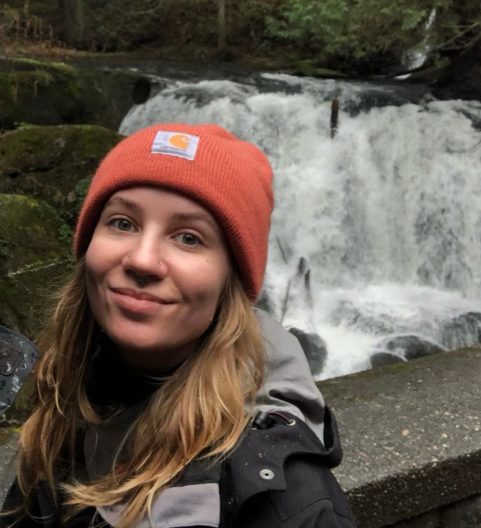
Grace Nightingale (she/they) – Magnolia Lead Teacher
Grace is originally from the Pacific Northwest but lived nomadically across the United States for several years. They graduated from Western Governor’s University with a Bachelor of Arts in Elementary Education and hold a Forest School Teacher certificate from the Forest School Teacher Institute. Before joining Fiddleheads in 2023, Grace previously taught with two other local nature-based preschools and an indoor Montessori school. Outside of teaching, Grace enjoys visiting new places of all kinds, communing with nature, crafting, and doting on her three cats.
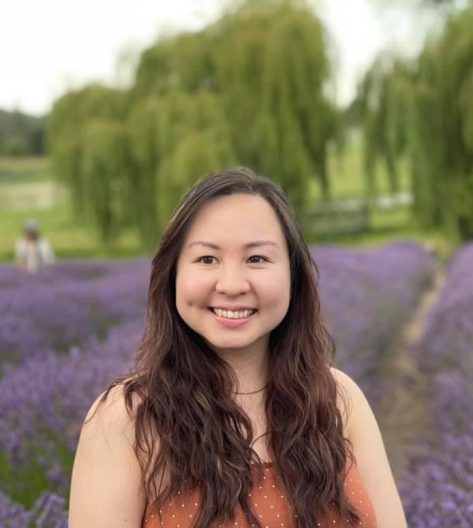
Nicole Chhou (she/her) – Magnolia Associate Teacher
Nicole grew up in Cambodia and moved to PNW during her high school years. She earned her Bachelor Degree in Environmental Studies at University of Washington. Prior to joining Fiddleheads Forest School, she was a childcare specialist at Parent Childcare Center. She gained interest in environmental education after she took a PNW natural history class. Immersing herself in nature has helped adjusting to new environments as she moved to the United States. It’s been her goal to engage nature exploration in early childhood education. She enjoys swimming, hiking, crocheting, and trying new food with her family and friends. Outside of work, she spends most of her time taking care of her cat, fish, and houseplants.
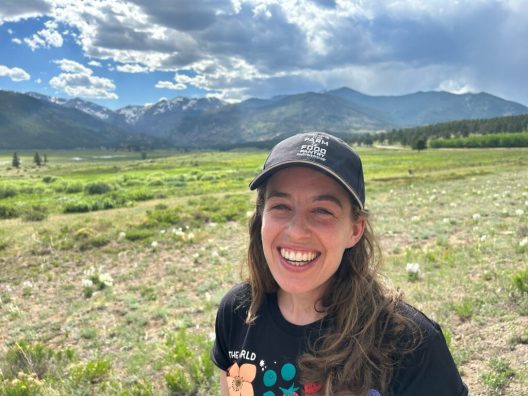
Emily Harrop (she/her) – Spruce Co-Teacher
Emily Harrop was born and raised in Seattle and has a background in education, regenerative farming, and food access. She got her Bachelor’s degree in Early Childhood Education and Master’s in Teaching for Elementary Education from UW. She taught in the Renton and Highline school districts before transitioning to farming in the Snoqualmie and Sammamish valleys for five seasons. She is excited to combine her passions of education and exploring the wonders of the natural world in this position at Fiddleheads. In her free time Emily enjoys hiking, camping, swimming, cooking, baking, and seeing live music.

Roo der Blatter (they/them) -Spruce Co-Teacher

Bryanna Mathias (she/her)- Float Teacher
Bryanna (pronounced like ‘Brian’ + ‘Anna’), was born and raised in Montana, and has had the pleasure of living in Seattle since 2011. As the eldest sister to her 11 siblings, she arrives to our program with an immense amount of personal experience with young children, as well as she holds a B.A.S. degree in Early Childhood Education from North Seattle College, with a focus on outdoor education. Bryanna has been teaching in the Seattle area since 2019. Originally, she began as a volunteer with Fiddleheads in Fall 2022 and has since began formally teaching for Fiddleheads since Summer 2025. Bryanna is passionate about fostering connections with children and their families in nature through curiosity, compassion, and empathy, and strives to meet children where they are through developmentally appropriate and culturally responsive practices. In her free time, Bryanna enjoys hiking, camping, traveling, dancing, playing guitar, cooking, reading/writing poetry, crocheting, playing games with friends, and spending time with her partner and their two silly cats.

Jayda Jessie (she/her)- Afternoon Maple Co-Teacher
Jayda was born and raised in rural Washington State. Growing up, most of her time was spent either getting lost in books or creating worlds outdoors. She studied agriculture and food system amongst the wheat fields of Washington State University and ultimately earned a degree in Agricultural Education. Jayda spent time as a career and technical educator, teaching students through
experiential learning. In this last year, she has worked with the Arboretum’s Youth and Family programs with students of all ages. Jayda likes to spend her free time cooking, crafting, reading and writing.
Eliza Lindley (she/her)- Afternoon Maple Co-Teacher
Raised in the Driftless Area of Wisconsin, Eliza channeled her passion for humans & the environment into a BS degree from the University of Wisconsin-Madison in Environmental Science and Life Sciences Communication. Since then, she has helped restore alpine lakes in the Sierra Nevada, create urban habitat in the neighborhoods of Missoula, lead place-based education in the Tetons, and engage summer campers in the wonders of the Salish Sea. Here at Fiddleheads, she’s thrilled to be finding a rhythm in the forest as she grows and learns and celebrates alongside her students! In her free time, she enjoys roaming around outside, making music, and scribbling down her thoughts about the world.”
Fiddleheads in the News
Media:
Outdoor Nature Based Facilities Video, Washington Department of Children Youth and Families, 5/15/2023
CityStream: Outdoor learning at Fiddleheads Forest School, City of Seattle, 5/05/2020
School’s Out, Olivia Dwyer, REI, 9/12/2019
Take Me to Your Fairy Village, Jenni Gritters, Experience Magazine, 11/28/2018
Learning About Outdoor Education in Norway, UW Botanic Gardens Blog, 12/21/2018
We’ve Forgotten What Nature Really Means, Kim Eckart, 1/6/18
At Nature Preschools, Classrooms are Outdoors, Julie Depenbrock, Education Week 1/17/17
At These Schools, The Classroom is Outdoors, Katie Campbell, Crosscut, 9/21/2016
Helping Kids Avoid Anxiety, Teaching Children Self-regulation at an Early Age, Darian Liard, 1/6/2016
Preschool Without Walls, Lillian Mongeau, New York Times, 12/29/2015
Free-Range Children, Erik Neumann, Bright, 10/15/15
Kids Go Outside and Learn at the Arboretum’s Outdoor Forest School, Valerie Easton, Seattle Times 6/15/15
Articles written by Fiddleheads Staff
Challenging Piaget: Western Influence in Kenya’s Early Childhood Reform, Meredith Whye, 12/30/2024
Beyond An Outdoor School: Nurturing A Child’s Nature-Connection, Hannah Bressler, 01/2020
Education in Context: The Role of Place in Nature-Based Education, Kit Harrington, Natural Start Alliance, 09/2017
Reading the Landscape: Early Literacy in the Outdoor Classroom, Joanna Wright, Natural Start Alliance, 11/2016
Magic, Wonder, Science and Exploration: The Educational Value of Fairy Villages, Kit Harrington, Natural Start Alliance, 07/2015
Inspiring a Future Generation of Educators: Forest School Internships, Sarah Heller, Natural Start Alliance, 03/2015
Check out what is going on at Fiddleheads Forest School by following us on Facebook and Instagram.
